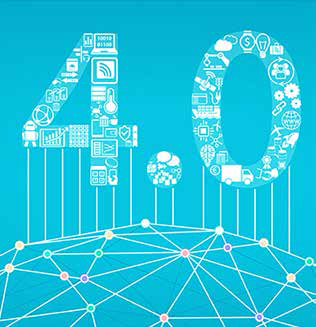The Fourth Industrial Revolution or also known as Industry 4.0 is characterised by increasing digitisation and interconnection of products, value chains and business models. Industry 4.0, which integrates technological advances into every facet of life, is bringing unprecedented changes to societies and organizations throughout the world, and this will only continue to permeate the spaces which we inhabit.
The multiple ramifications of digitalization and the accompanying acceleration and increased complexity of work activity makes it urgent to revisit the assumptions and practices that have defined our ways of leading and organizing until the present day and to propose possible ways forward.
In order for businesses to thrive in this “new world”, a different kind of leadership is needed. During the World Economic Forum 2016, Professor Klaus Schwab said: “We are living in a time of extraordinary change. In this Fourth Industrial Revolution, every individual, business, industry and government is being impacted by breakthroughs in computing power, connectivity, artificial intelligence (AI), biotechnology and other innovative technologies. This is a revolution without boundaries spreading across the world with incredible velocity”.
The quote reflects the profound real state of the world today and how Industry 4.0 will impact our lives including our workplace. For example, in today’s fast pace work environment, speed of decision-making has changed. We find ourselves with far less time than we used to have to make informed decisions.
MIT professors, McAffee and Brynjolfsson, suggest that digitalisation of the workplace also means re-thinking the balance between minds and machines, between products and platforms, and between the core and the crowd. They argued that understanding when, where, how and why these machines, platform and crowds can be effective is the key to success in the economy today.
Another significant change is the unprecedented speed of communication and the explosion in the amount of data. All these require a new set of skills – a blend of technical prowess, creativity and emotional intelligence to navigate this new business landscape. With numerous scientific discovery and technological advancement that has transformed many aspects of our daily and working lives, leaders are responsible to navigate these changes with integrity and to provide positive, impactful leadership as the business landscape takes a new shape.
As Professor Klaus Schwab notes, “We need leaders who are emotionally intelligent, and able to model and champion cooperative working. They’ll coach, rather than command; they’ll be driven by empathy, not ego. The digital revolution needs a different, more human kind of leadership”.
ISFIRE ASKED LEADING PROFESSIONALS TO SHARE THEIR THOUGHTS ON WHAT LEADERSHIP SKILLS ARE NEEDED TO HELP PREPARE FOR CHANGES BROUGHT ABOUT BY THE 4TH INDUSTRIAL REVOLUTION. HERE IS WHAT THEY HAD TO SAY:

Mohd Muazzam Mohamed
Acting Chief Executive Officer, Bank Islam Malaysia Berhad
As widely reported, we will see more of artificial intelligence and machine learning, advanced robotics in production and manufacturing, and autonomous transportation. These will not only change the way we use machines and computers, it will also change the way we live and how we make our living. Job requirements will change. There will be different skillsets requirements altogether in the jobs market. Relevant and useful skill sets in the 1990s will soon become irrelevant and outdated in the near future.
Advanced robotics render technical and vocational skillsets irrelevant as factories will employ full robotics and automation at the production lines. With the advent of artificial intelligence, there is a threat that base knowledge of any profession is made available to, and better exploited by, computers that can access and analyse the base knowledge faster than human. Autonomous transportation will radically change the industry that will enable more efficient and effective logistics.
The impact differs across industries. While banking and finance is considered to be less affected, we have seen the advent of FinTech and how quickly banks have to adapt. Use of technology have forced banks to re-think the way they service their customers. Investments are allocated much more for technology infrastructure. Use of robo-advisory is becoming more commonplace in banks.
As leaders, we need to be aware of and acknowledge the threat of changes brought about by IR 4.0 to our organisations. It is important that we address the people and culture of the organisation. Firstly, we need to change the organisational mindset to be creative and innovative to stay ahead. Banks need to learn from organisations in other industries in being more adaptable to rapid changes and move away from bureaucracy.
Secondly, we need to educate and re-train the workforce to be adaptable to the rapid technological changes. As transaction processing are automated, the operations staff need to be re-skilled to become problem solvers and solutions providers to the banks’ customers. Banks’ employees should be trained to have cognitive flexibility, greater service orientation and deeper emotional intelligence.
“AS LEADERS, WE NEED TO BE AWARE OF AND ACKNOWLEDGE THE THREAT OF CHANGES BROUGHT ABOUT BY IR 4.0 TO OUR ORGANISATIONS”
Thirdly, we must be conscious of bringing new skill sets into the organisation. There need to me more needs for data scientists, programmers and engineers in banks compared to the past. The other aspect is that as leaders, we need to invest into the future consciously and in this aspect, allocate resources towards enhancing technology infrastructure. There would be less focus on physical infrastructure of branch networks and this would naturally mean that capital investment should be more towards building digital solutions for the customers. There should be greater collaboration with technology partners.


Wajeeha Hussain Awadh
Digitalization & Fintech Initiatives, Al Baraka Banking Group
The Fourth Industrial Revolution is unlike the earlier revolutions, the speed of technology improvement is bringing a lot of change. In fact, the lines between the digital, physical, and biological systems are too blurry to identify what is human and what is artificial. Given these radical changes, it is expected that in a decade time, around 40% of the current businesses will no longer exist.
For these businesses to stay relevant in the market, leaders should have some essential skills to deal with these dramatic shifts. Accordingly, there three key skills future leaders should develop. First is the adaptability to changes, where leaders should embrace changes rather than resisting. Second is the speed of decision-making, where leaders should take fast decisions to cope with the speed of changes happening in the industry. Third is the collaboration and partnerships, where businesses should not work in silos and instead collaborate with different components of the ecosystem to stay on top of the change and succeed. We are currently at the beginning of the revolution and leaders need to gear up for the coming changes.

Mazin Khalil
Manager, UAE Financial Services and Global Islamic Finance, Grant Thornton
The 4th Industrial Revolution brings forward both opportunities and challenges to the element of leadership, given the fast-paced advancement of the surrounding economy. As defined by the World Economic Forum in March 2018: “The revolution is characterized by a fusion of technologies that is blurring the lines between the physical, digital, and biological spheres collectively referred to as cyber-physical systems. It is marked by emerging technology breakthroughs in a number of fields, including robotics, artificial intelligence, nanotechnology, quantum computing and biotechnology”.
An example can be taken from my own industry of speciality, Islamic finance. The relatively new industry faced several obstacles on the outset, however, the tremendous growth rate across banking, capital markets and insurance captured global attention with superb indicators across.
Leadership in Islamic finance can be viewed as a demonstration of the required skills in the 4th Industrial Revolution, as the industry is based on timeless guidelines from the last millennium, customized to fit into the established financial world within a span of five decades. The required skills include an open mind, creative communication, agility and technological awareness. When mastered, it is bound to facilitate a guiding infrastructure to both leaders and recipients to achieve the common purpose of sustainable growth, and a platform for future generations to proceed into greater heights.

Amir Firdaus
Treasurer, Al Rayan Bank
In this new digital era, we are seeing many changes, particularly when it comes to the workplace. Today, workforces are often dispersed geographically and are more digitally adept, meaning we are seeing a lot of changes to processes and to the way we approach tasks. Traditional leadership, therefore, needs to adapt to be compatible with this digital age. There are three key areas that we should considered when it comes to preparing leaders for changes brought about by the fourth industrial revolution. Firstly, good leaders should be able to acknowledge the need to change. Good leaders of today are visionaries and are able to identify when it is time to change, rather than shy away from the idea. They understand that they cannot afford to stand still or become complacent.
Secondly, decision-making is the quality of a good leader. But traditional, linear thinking isn’t enough to help businesses thrive – understanding you might need to make the decision to change tact is equally important. But recognising that an approach or tactic isn’t working isn’t a sign of failure. Acknowledging when a plan isn’t coming together is vital in today’s fast-paced environment and it is often these moments of discovery that lead to an even greater ‘eureka’ moment.
Thirdly, adaptability in today’s climate is critical. A simple change in the way we do things can be very impactful and can enable organisations to thrive. Banking is a very good example of this. While we used to solely visit banks in-person for advice, in response to today’s digital natives, we are seeing the growth of online platforms where you can receive informed advice virtually. Ultimately, using all the tools at our disposal in line with current trends and behaviours is key when it comes to successfully adapting to the environment around us.

Mansoor Danish
Islamic Wealth Consultant
Digital revolution, which is driving the 4th Industrial Revolution, is happening at an exponential pace. Disruptive technologies and innovations are a reality across all industries and sectors today. The real challenge in this stage is to have leaders who are able to understand the new and rapidly changing consumer behavioural pattern, use the latest technology to enhance the customer experience and invest in research and development to benefit from the digital revolution. Amidst all these, the need to have ethical leaders will be of utmost importance. With digital revolution, the definition of privacy or our notions of sense of privacy is fast changing. Leaders have the added responsibility to ensure that customer data is protected and not compromised on any circumstances.

Mohamed Roushdy
Head of Technology, Dubai Asset Management
The Fourth Industrial Revolution would affect all our life and business ecosystem, the way we do things in the past would dramatically change, as well as the role of many people might change too. You might consume services from service providers and sell or share some of these services with someone else. Hence, you could be a consumer and a provider of service at the same time, making us more connected like never before. This is a real disruption to the way we had been living and using technologies. But how would these impact leadership? Leaders will have to be equipped with more skills than they ever had as they will have to lead both people and machines (robots) and make decisions in the face of more uncertainties but more possibilities too. Based on the above arguments, leaders of the Fourth Industrial Revolution would need to have the following competencies:
- Agility
- Continuous learning and personal development
- Ability to manage and lead teams in different geography, time zones and workplace
- Emotional intelligence
- Social intelligence
- Being an influencer
- The ability to co-create
- Adaptability




